2019 Job Seeker Survey Report
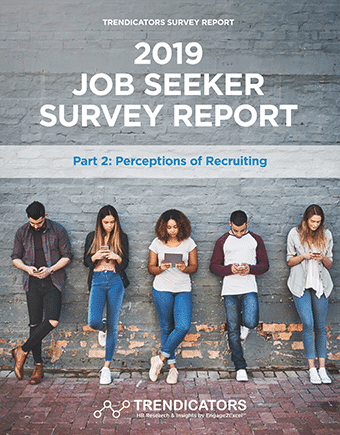
INTRODUCTION
Candidate Experience has emerged as the buzz-worthy term of choice among thought leaders in recruiting. In today’s highly competitive market for talent, creating better candidate experiences can reduce your dropout rate. More engaging, two-way candidate experiences can help you better assess job fit to reduce voluntary turnover rates. And, candidate experience is also an important aspect of your employer brand, which is particularly important if your candidates are also customers or prospective customers.
In this report, the second edition of our 2019 Job Seeker Survey series, we explore candidate perceptions of the recruiting process. On the following pages, you’ll learn what active and passive job candidates think about application and interview processes; what their preferences and perceptions are for engaging with potential employers; and what is most important to candidates in the overall recruitment experience.
The results published in this report are based on a survey of 1,500 individuals, from all major industry sectors and demographic groups, including 802 active job seekers, 574 passive job seekers and 124 non-job seekers.
Survey Demographics
Number of Respondents: 1,500
Countries Represented: United States
Industries Represented: All major industries
Respondent Demographics: U.S. adult workers in all job types with proportionate representation of gender, age group and racial/ethnic origin
Margin of Error: 95% confidence level +/- 1.5%
82% of passive candidates say they are willing to learn about a new opportunity
(n=574)
Trendicators is the research division of Engage2Excel, a leading provider of employee recognition, engagement survey and talent acquisition solutions. Trendicators provides original research, along with reports on insights and best practices from industry leaders and experts.
Download
 hbspt.cta.load(123973, '843a016c-e46e-4a45-95e2-902765f8eeb2', {});
hbspt.cta.load(123973, '843a016c-e46e-4a45-95e2-902765f8eeb2', {});
The Application Process
The application process creates an all-important first impression in determining the quality of a candidate’s experience. What matters most to candidates when applying? Overwhelmingly, candidates want the application process to be easy and straightforward. Nearly three-quarters expect the application process to be mobile, with 9% indicating they’d drop out if it isn’t. More than a third think that the entire application process should not take longer than 14 minutes, and nearly half believe that taking 2 to 3 assessments is reasonable.
Survey Takeaways: Go through the application process yourself to identify steps that are either time-consuming or frustrating.
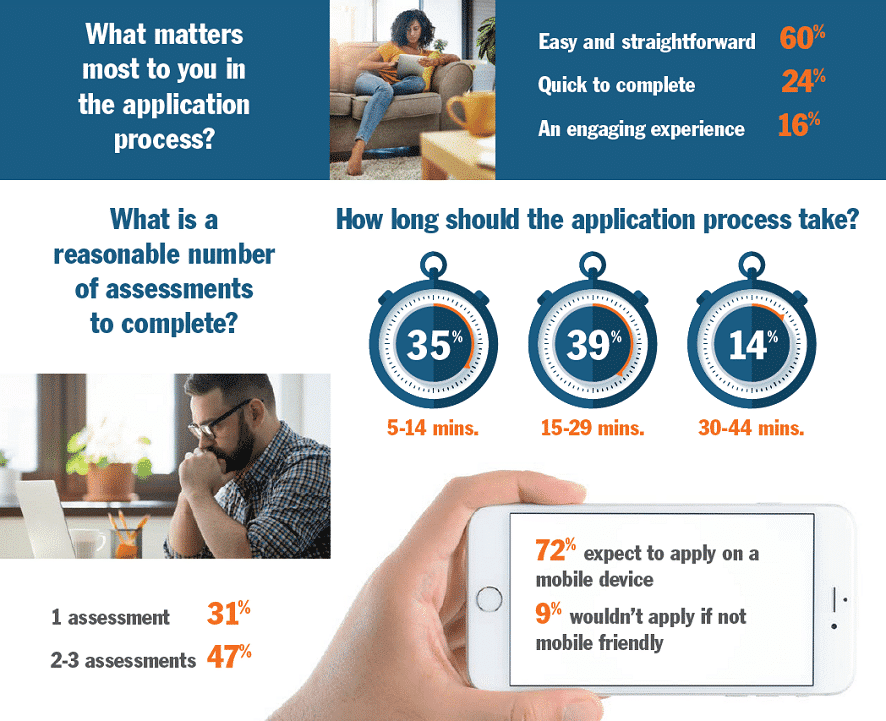
Download
 hbspt.cta.load(123973, '843a016c-e46e-4a45-95e2-902765f8eeb2', {});
hbspt.cta.load(123973, '843a016c-e46e-4a45-95e2-902765f8eeb2', {});
The Interview Process
Of all of the steps in the recruitment process, interviewing consumes the most internal resources. While unstructured interviews are quite common, a large body of evidence indicates that they actually increase the likelihood of a bad hire. To compensate, companies conduct panel interviews and are increasingly relying on structured video interviews to reduce bias. Our survey indicates that nearly half of candidates are comfortable with a panel of two to three interviewers in a live interview and 63% are comfortable with a panel video interview. Fewer, 46%, are comfortable with a one-way video interview, and 43% expect video interviews when applying for a job.
Survey Takeaways: Candidates are increasingly comfortable with video interviews, which can help reduce bias and streamline the recruiting process.
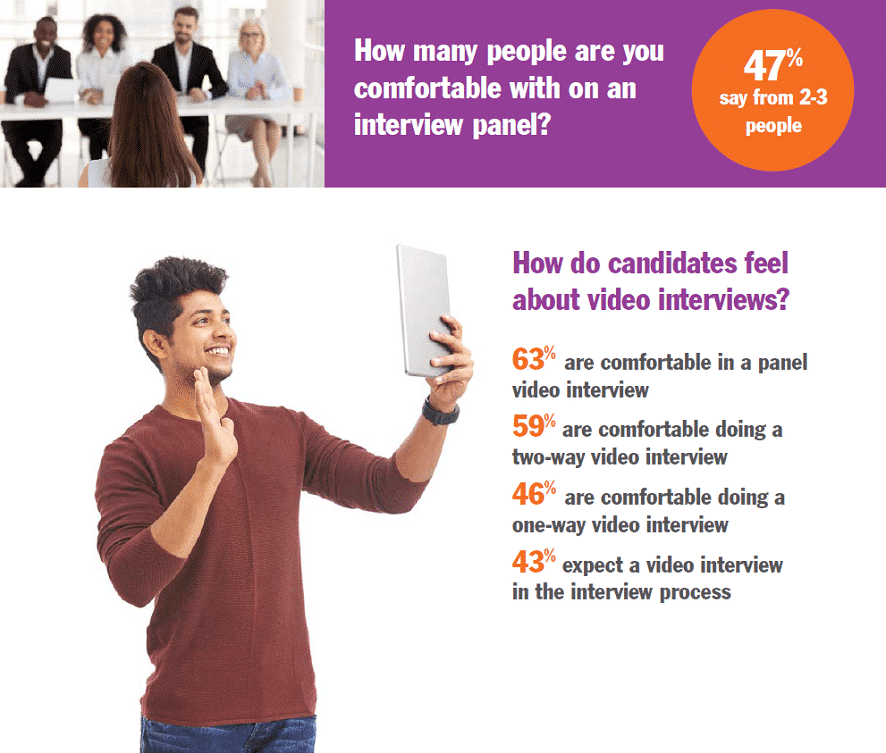
Download
 hbspt.cta.load(123973, '843a016c-e46e-4a45-95e2-902765f8eeb2', {});
hbspt.cta.load(123973, '843a016c-e46e-4a45-95e2-902765f8eeb2', {});
Candidate Engagement
Candidate engagement is the process of interacting with candidates throughout the recruitment experience. This greatly influences how an individual perceives your company and the job opportunity. Our survey reveals that ”openness & honesty” is the most important factor in keeping candidates engaged. Candidates prefer, by a margin of 4-to-1, a phone call or email over a text message. Speaking with a mentor is of interest for more than two-thirds of candidates, and 44% would participate in an organization’s social community—even if there were no current openings.
Survey Takeaways: Use the topics below (without the results) as a discussion starter at an upcoming meeting with your recruiting team. Ask people how they think candidates responded. Then share the results and let the brainstorming begin.
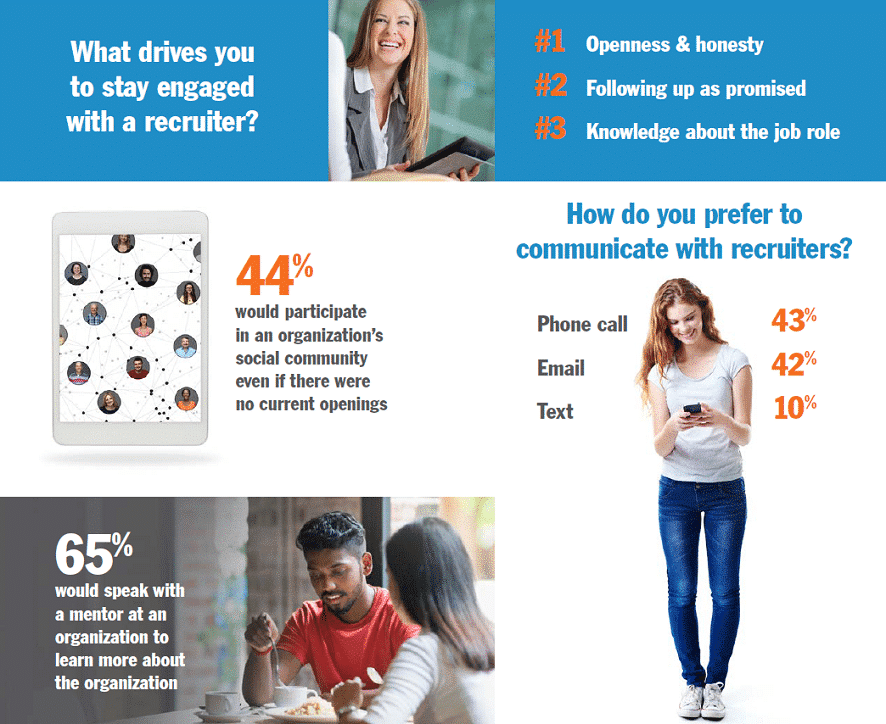
Download
 hbspt.cta.load(123973, '843a016c-e46e-4a45-95e2-902765f8eeb2', {});
hbspt.cta.load(123973, '843a016c-e46e-4a45-95e2-902765f8eeb2', {});
The Recruitment Experience
There is widespread belief that the recruiting process is broken. Automation designed to streamline application, screening and selection workflows has led to a depersonalization that companies are now trying to address with chatbots, candidate CRM and other technologies. But how do candidates regard the recruiting process? Our survey reveals that 79% of candidates are satisfied overall, with 83% regarding it as “smooth & efficient,” and three-quarters indicating that the process made them feel valued. Candidates had the most positive experience with hiring managers, whom they consider the most important person to meet.
Survey Takeaways: Before reinventing steps in your recruiting process, get first-hand feedback from recent candidates and new hires.
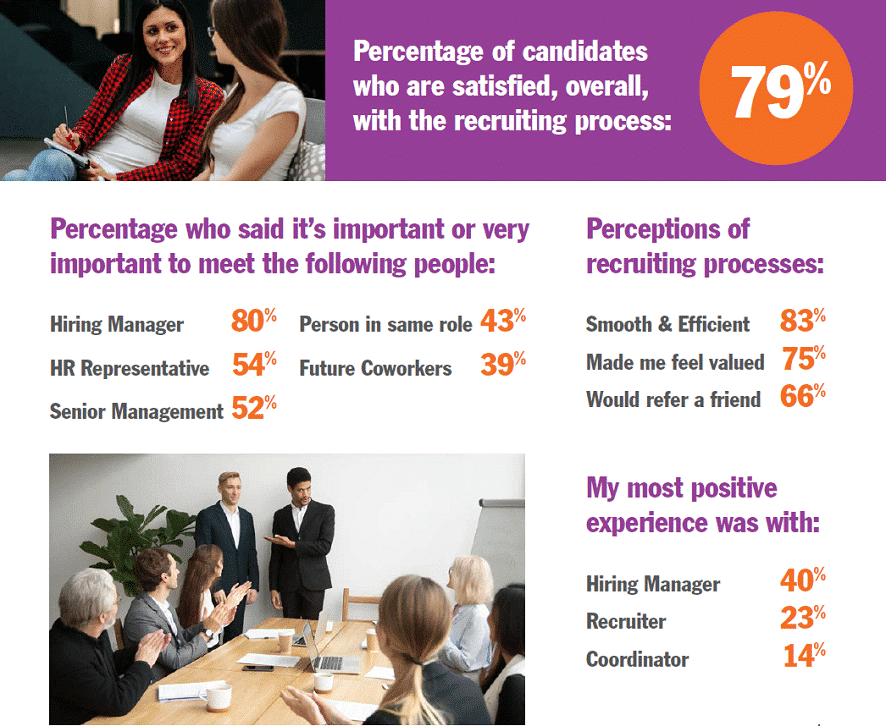
Download
 hbspt.cta.load(123973, '843a016c-e46e-4a45-95e2-902765f8eeb2', {});
hbspt.cta.load(123973, '843a016c-e46e-4a45-95e2-902765f8eeb2', {});
Other Candidate Perceptions
Nearly three-quarters of survey respondents said that an organization’s career site is either important or very important in influencing their decision to pursue a job opportunity. While most surveys report an average time-to-hire of two to four weeks, one-third of our survey respondents indicated that they received an offer within one week, and a quarter reported receiving an offer within 8 to 14 days.
Survey Takeaways: Among the more surprising results from this survey is the fact that interest in having a career spans all age groups; 25% say working for a manager who is younger than themselves would influence their acceptance decision; and while 60% of our survey respondents believe it’s okay for employers to conduct pre-employment screening for drugs, nearly a third say they’d stop pursuing a job if a drug test were required.
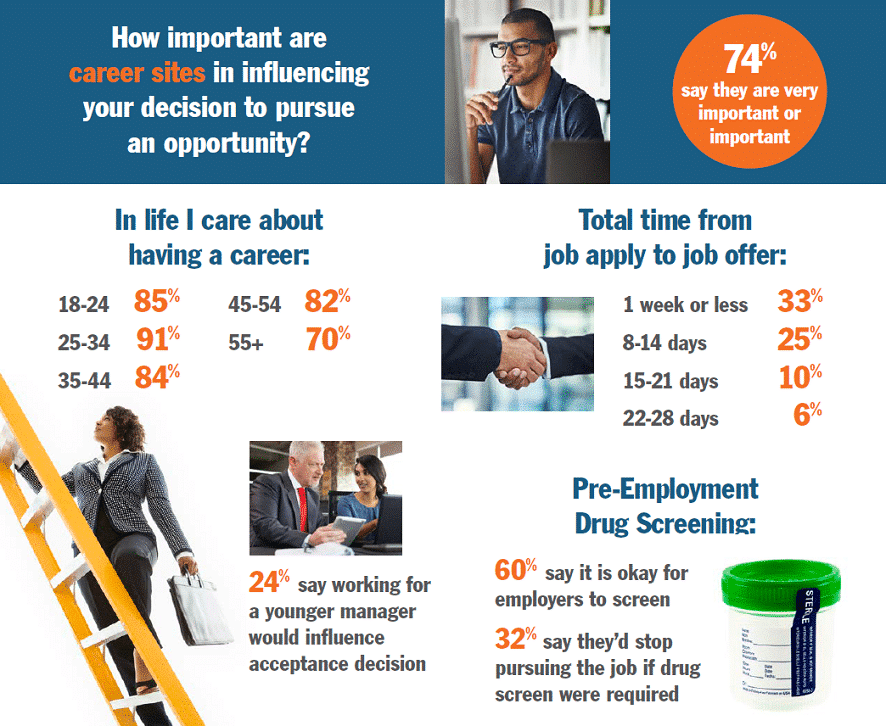
Download
 hbspt.cta.load(123973, '843a016c-e46e-4a45-95e2-902765f8eeb2', {});
hbspt.cta.load(123973, '843a016c-e46e-4a45-95e2-902765f8eeb2', {});